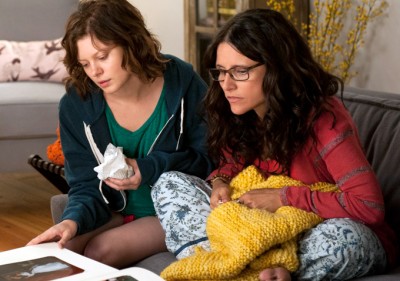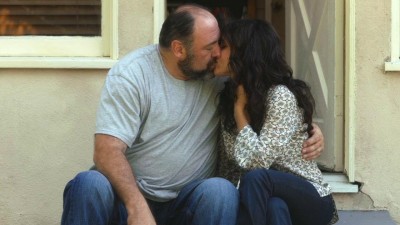
Nicole Holofcener’s Enough Said presents a slightly tricky situation. On the one hand, there’s tendency to want to overpraise the film just because it contains one of the last performances (there’s one more to come) by James Gandolfini. On the other hand, Gandolfini’s death hovers over the movie, making it something of a bittersweet experience. Now having said that, Enough Said is certainly a likable and pleasant little movie. It’s hard not to care about the characters even when they do something stupid — and they do more than their share of stupid. It’s consistently entertaining and funny (without ever being hysterically so) — and, yes, I’d recommend it as a very nice way to spend 90 minutes at the movies. If you happen to be a fan of either Gandolfini or Julia Louis-Dreyfus, I’d move that recommendation up to the level of essential.

Don’t misunderstand, Enough Said is not a great picture — or anything like one — and it has one of those plots that hinges on a supposedly rational human behaving in a completely idiotic manner in order to keep that plot going right into the penultimate gloomy reel (this is a romantic comedy). The idea here is that comfortably upscale masseuse Eva (Louis-Dreyfus) falls for comfortably upscale television archivist Albert (Gandolfini) — only to discover that even more comfortably upscale poet Marianne (Catherine Keener), whom Eva has taken on as her new client and friend, is Albert’s ex-wife. (You will have noticed by now that everyone is comfortably upscale. That’s because this is a Nicole Holofcener picture.) Now, at this point in real life, Eva would tell Marianne that she’s dating her ex-husband. But not here. Why? Well, mostly because of what I said — it drives the film.

In Holofcener’s favor, she uses this device with some degree of cleverness. Rather than just adhering to the farce-like nature of keeping two people from finding out about each other, Holofcener uses every bad thing that Marianne says about Albert to chip away at Eva’s own image of him. (When the cat’s out of the bag, Eva has allowed Marianne to “poison” their relationship.) Some of this works, but some of it is a stretch. Seriously, why would what Marianne says about Albert being a clumsy lover suddenly manifest itself only after Eva’s been told that? More interesting (and how intentional this is may be open to question) is that the further Eva goes with her Marianne-inspired re-evaluation, the more like Marianne she becomes. This is hardly desirable, since Marianne is what, down-home, we’d call a dose. This is a character so unpleasant that even Catherine Keener can’t make her likable on any level.

That Holofcener has created something more like a sitcom is probably enhanced by the presence of Louis-Dreyfus. That particular realm is, after all, her usual province. But the truth is that Holofcener’s movies have always played a good bit like sitcoms — quirkier and more stylish and intelligent than most, but not all that far removed when stripped to their essence. This really doesn’t matter all that much, since Enough Said is a film that rises or falls on the strength of its stars, and both Gandolfini and Louis-Dreyfus acquit themselves admirably. Perhaps Holofcener’s greatest accomplishment here was in seeing the slightly wonky chemistry the two would have as a screen couple — and that may well be reason enough to call the film a success. Rated PG-13 for crude and sexual content, comic violence, language and partial nudity.




Does this mean you’re going to start [i]The Sopranos[/i]?
Uh…no. I saw a few episodes years and years ago. Did nothing for me. Odd thing is that when I think of Gandolfini, the first things that occur to me are In the Loop and The Mexican.
He was good in GET SHORTY too.
Edie Falco’s tribute Sunday was really nice.
I was thoroughly charmed by this pretty much throughout, although I’m not sure the ending was totally satisfying to me.
Perhaps it’s because this has been such a disappointing cinemagoing year – ABOUT TIME and some other choice pictures aside – that this stood out as sweet, engaging and gentle against so much noisy, nihilistic and grim.
Noisy perhaps, but without movies from Michael Haneke and David Fincher, where’s the nihilism? Actually, I’m really kind of curious as to the films you’ve found so off-putting.